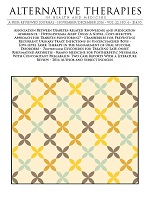Alternative medicine is any practice that aims to achieve the healing effects of medicine despite lacking biological plausibility, testability, repeatability or evidence of effectiveness. Unlike modern medicine, which employs the scientific method to test plausible therapies by way of responsible and ethical clinical trials, producing repeatable evidence of either effect or of no effect, alternative therapies reside outside of mainstream medicine and do not originate from using the scientific method, but instead rely on testimonials, anecdotes, religion, tradition, superstition, belief in supernatural "energies", pseudoscience, errors in reasoning, propaganda, fraud, or other unscientific sources. Frequently used terms for relevant practices are New Age medicine, pseudo-medicine, unorthodox medicine, holistic medicine, fringe medicine, and unconventional medicine, with little distinction from quackery.
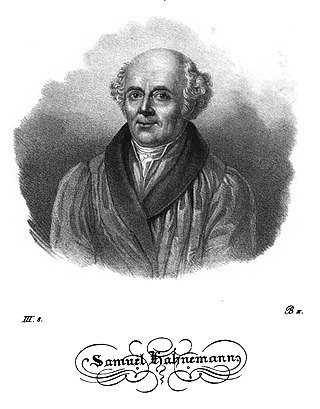
Homeopathy or homoeopathy is a pseudoscientific system of alternative medicine. It was conceived in 1796 by the German physician Samuel Hahnemann. Its practitioners, called homeopaths or homeopathic physicians, believe that a substance that causes symptoms of a disease in healthy people can cure similar symptoms in sick people; this doctrine is called similia similibus curentur, or "like cures like". Homeopathic preparations are termed remedies and are made using homeopathic dilution. In this process, the selected substance is repeatedly diluted until the final product is chemically indistinguishable from the diluent. Often not even a single molecule of the original substance can be expected to remain in the product. Between each dilution homeopaths may hit and/or shake the product, claiming this makes the diluent "remember" the original substance after its removal. Practitioners claim that such preparations, upon oral intake, can treat or cure disease.

Naturopathy, or naturopathic medicine, is a form of alternative medicine. A wide array of practices branded as "natural", "non-invasive", or promoting "self-healing" are employed by its practitioners, who are known as naturopaths. Difficult to generalize, these treatments range from the pseudoscientific and thoroughly discredited, like homeopathy, to the widely accepted, like certain forms of psychotherapy. The ideology and methods of naturopathy are based on vitalism and folk medicine rather than evidence-based medicine, although practitioners may use techniques supported by evidence. The ethics of naturopathy have been called into question by medical professionals and its practice has been characterized as quackery.
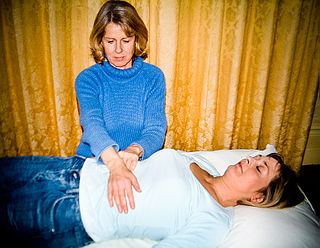
Reiki is a pseudoscientific form of energy healing, a type of alternative medicine originating in Japan. Reiki practitioners use a technique called palm healing or hands-on healing through which, according to practitioners, a "universal energy" is transferred through the palms of the practitioner to the patient, to encourage emotional or physical healing.
The National Center for Complementary and Integrative Health (NCCIH) is a United States government agency which explores complementary and alternative medicine (CAM). It was initially created in 1991 as the Office of Alternative Medicine (OAM), and renamed the National Center for Complementary and Alternative Medicine (NCCAM) before receiving its current name in 2014. NCCIH is one of the 27 institutes and centers that make up the National Institutes of Health (NIH) within the United States Department of Health and Human Services.

JAMA (The Journal of the American Medical Association) is a peer-reviewed medical journal published 48 times a year by the American Medical Association. It publishes original research, reviews, and editorials covering all aspects of biomedicine. The journal was established in 1883 with Nathan Smith Davis as the founding editor. Kirsten Bibbins-Domingo of the University of California San Francisco became the journal editor-in-chief on July 1, 2022, succeeding Howard Bauchner of Boston University.
The Ministry of Ayush, a ministry of the Government of India, is responsible for developing education, research and propagation of traditional medicine and alternative medicine systems in India. Ayush is a name devised from the names of the alternative healthcare systems covered by the ministry: ayurveda, yoga & naturopathy, Unani, Siddha, Sowa Rigpa, and homeopathy.

The Journal of Alternative and Complementary Medicine is a monthly peer-reviewed medical journal covering alternative medicine published by Mary Ann Liebert. It was established in 1995 and is the official journal of the Society for Acupuncture Research. The editor-in-chief is John Weeks, who succeeded the founding editor, Kim A. Jobst.
Functional medicine (FM) is a form of alternative medicine that encompasses a number of unproven and disproven methods and treatments. It has been described as pseudoscience, quackery, and at its essence a rebranding of complementary and alternative medicine. In the United States, FM practices have been ruled ineligible for course credits by the American Academy of Family Physicians because of concerns they may be harmful.
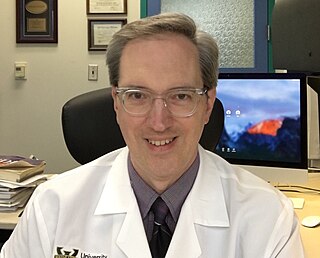
David Henry Gorski is an American surgical oncologist and professor of surgery at Wayne State University School of Medicine. He specializes in breast cancer surgery at the Karmanos Cancer Institute. Gorski is an outspoken skeptic and critic of alternative medicine and the anti-vaccination movement. A prolific blogger, he writes as Orac at Respectful Insolence, and as himself at Science-Based Medicine where he is the managing editor.

Science-Based Medicine is a website and blog with articles covering issues in science and medicine, especially medical scams and practices. Founded in 2008, it is owned and operated by the New England Skeptical Society, and run by Steven Novella and David Gorski.

Kimball C. Atwood IV is an American medical doctor and researcher from Newton, Massachusetts. He is retired as an assistant clinical professor at Tufts University School of Medicine and anesthesiologist at Newton-Wellesley Hospital.

Mark Alden Crislip is an infectious disease doctor in Portland, Oregon and former chief of infectious diseases at Legacy Health hospital system. Crislip has generated three podcasts, QuackCast, PusCast, and Gobbet o' Pus. A writer for medicine-related blogs, he has compiled his blog posts into several books. He co-founded the Society for Science-Based Medicine and served as president from 2013 to 2019.
Homeopathy is a peer-reviewed medical journal covering research, reviews, and debates on all aspects of homeopathy, a pseudoscientific form of alternative medicine. It is the official journal of the London-based Faculty of Homeopathy. The journal was established in 1911 as the British Homoeopathic Journal, resulting from a merger between the British Homoeopathic Review and the Journal of the British Homoeopathic Society. It uses its current name since 2001 and the editor-in-chief is Robert Mathie.
The Journal of Integrative Medicine is a bimonthly peer-reviewed medical journal covering all aspects of complementary and alternative and integrative medicine. It was established in 2003 as the Journal of Chinese Integrative Medicine and obtained its current title in 2013. It is published by Science Press and is distributed by Elsevier.
Larry Dossey is a physician and author who propounds the importance for healing of prayer, spirituality, and other non-physical factors.
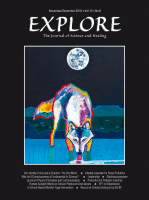
Explore: The Journal of Science & Healing is an interdisciplinary journal that publishes papers on alternative medicine six times per year. It was established in 2005 and is published by Elsevier. The executive editor is faith healing advocate Larry Dossey, and the co-editors-in-chief are hypnotherapist, acupuncturist, and herbalist Benjamin Kligler, an associate professor at the Albert Einstein College of Medicine, and parapsychologist Dean Radin. The journal has been described as a "sham masquerading as a real scientific journal" which publishes "truly ridiculous studies", such as Masaru Emoto's claimed demonstration of the effect of "distant intention" on water crystal formation.
Vinayak K. Prasad is an American hematologist-oncologist and health researcher. He is a professor of Epidemiology and Biostatistics at the University of California, San Francisco (UCSF). He is the author of the books Ending Medical Reversal (2015) and Malignant (2020).
Alternative medicine describes any practice which aims to achieve the healing effects of medicine, but which lacks biological plausibility and is untested or untestable. Complementary medicine (CM), complementary and alternative medicine (CAM), integrated medicine or integrative medicine (IM), and holistic medicine are among many rebrandings of the same phenomenon.

The Western Journal of Emergency Medicine: Integrating Emergency Care with Population Health, (WestJEM) is a bimonthly peer-reviewed, fully open access medical journal.
